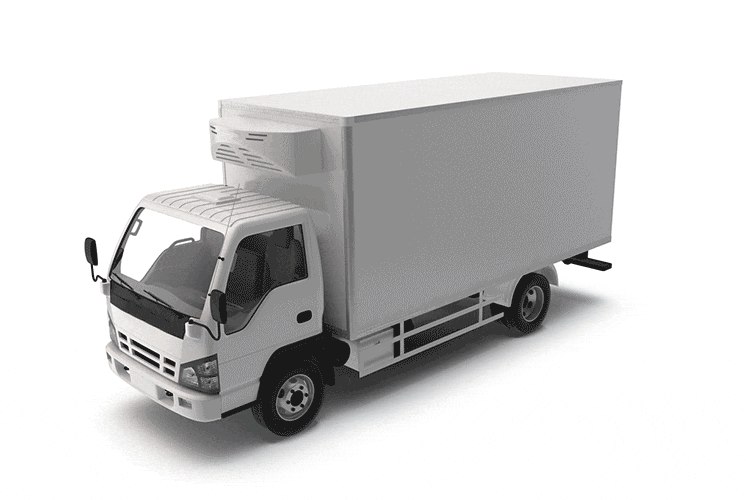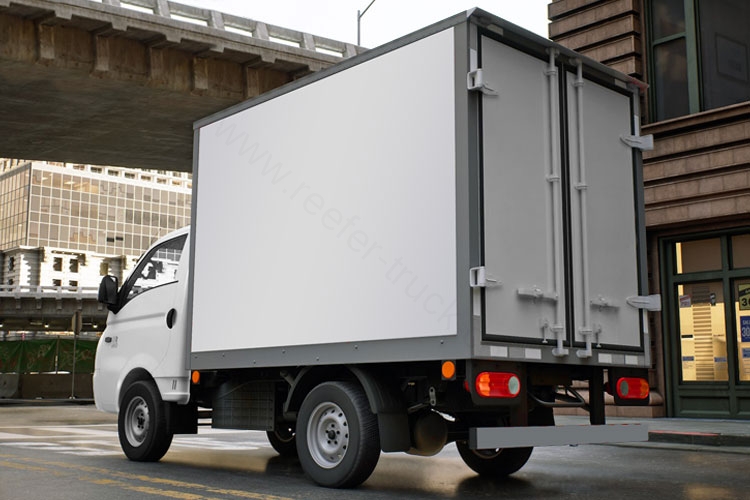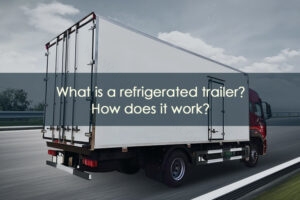Refrigerated trucks and Freezer trucks both belong to the Refrigerated truck category, the main difference between them is the type of goods transported, i.e. there is a clear distinction between the uses of these trucks. Freezer trucks have a refrigeration unit of more than 10,000 watts, which is more prominent in terms of energy consumption, higher overall costs, and stricter temperature management. Refrigerated trucks are mainly used for transporting perishable goods and fruits and vegetables, while Freezer trucks are generally used for intercontinental transport, with frozen meat as the main cargo.
Characteristics of Refrigerated truck
A refrigerated truck is also called a ‘Refrigerated truck’. Fresh meat and vegetables cannot be sold immediately if they are transported in a Freezer truck, which controls the temperature at 0-7°C and maintains the temperature, preventing spoilage and decay.
These trucks are used to transport fresh vegetables and meat. Refrigerated trucks are also used for most dairy deliveries.
Refrigerated trucks are the best choice for goods that don’t need to be frozen, but require low temperatures to prolong shelf life and, in some cases, inhibit the growth of bacteria.
Temperature
The temperature inside the Refrigerated truck is generally maintained at 0-7°C (>32°F).
Applications
Ideal for transporting fresh fruit and vegetables, flowers, fresh meat (non-warehouse transport), and daily dairy deliveries.
Generally used in supermarkets, restaurants, store-to-store delivery, for short-distance delivery in urban areas. Generally speaking, his transport range will not exceed 300 kilometers, very fast and convenient. They don’t need a Freezer, otherwise, thawing will take more time and will consume more cost.

Characteristics of Freezer truck
Freezer trucks are generally used for transport below 0°C. They are more suitable for long-distance transport of goods that require a Freezer. Its Freezer capacity is much larger than that of a Refrigerated truck, and its refrigeration equipment has a power of more than 10,000 watts, which is able to maintain the low temperature stably. In appearance, it is basically the same structure as the Refrigerated truck.
Temperature
The Freezer truck operates at temperatures well below 0°C, typically around -20°C. The Freezer truck’s temperature is around -20°C. The Freezer truck’s temperature is around -20°C. During each transport, the refrigerated unit will start working 1 hour earlier until it reaches the required temperature for the goods.
Applications
Used for Freeze meat, vegetables, medicines, cosmetics, ice cream, and other goods transport.
Insulation and cooling performance
They both have a similar body structure and use FRP XPS foam panels as body panels, so they have excellent thermal insulation performance. The biggest difference between them is that the Freezer truck has better refrigeration capacity and it has better refrigeration equipment to keep the temperature lower.
Refrigerated trucks have a refrigeration capacity of between 3,000-7,000 watts and Freezer trucks have a refrigeration system of 10,000 watts or more, and they can create intense cold air and reach the desired designation quickly and reliably for a long period of time. It is able to combat high-temperature environments very favorably.
In addition, the insulation performance is also related to the body material, avoiding panels that have water absorption, once absorbed, they will not be able to insulate properly. At the same time, the material must have high thermal conductivity and high strength properties. Choose CARBODY for excellent Refrigerated truck and Freezer truck bodies.
Operating Costs
The operating cost of a Freezer truck is greater than that of a Refrigerated truck, with an overall purchase price of $50,000-$100,000 and an annual maintenance cost of $10,000 or more. This is because it requires constant power generation to support its powerful truck refrigeration unit and requires regular maintenance.
The Refrigerated truck, which can be purchased for $30,000-$80,000, is relatively more affordable, doesn’t consume as much fuel, and requires less than $10,000 in annual maintenance costs.
But when it comes to refrigeration capacity, the Freezer truck has an outstanding advantage because its Freezer capacity is much better and it can bring higher profits.
If it’s a compact reefer, the cost is higher; if you buy a used reefer, the operating cost is higher.
Real-time temperature monitoring of refrigerated trucks
Both Refrigerated trucks and Freezer trucks require real-time temperature monitoring to ensure that the temperature inside the vehicle is constant at all times, and the data is transmitted to a dashboard display in the cab (which is mainly used to monitor temperature changes).
For Freezer trucks, more temperature sensors are needed for better temperature control.
Most of today’s temperature sensors can use Bluetooth temperature sensors (with a control distance of up to 500 meters) and can use data transmission, not only for automatic alarms but also for real-time tracking on a mobile phone or computer. As soon as the original temperature is exceeded, an alarm is issued. The temperature sensors are distributed around the inside of the trunk for better temperature control.

How to choose a Refrigerated truck or a Freezer truck?
It mainly depends on the temperature required to transport the goods, and the distance to be traveled. Freezer trucks will cost more than Refrigerated trucks but can get higher profits and returns.
Contact CARBODY today for a Refrigerated truck box solution!
If you are interested in a Refrigerated truck or Freezer truck box and would like more information, get in touch with CARBODY today. Our specialists will get in touch with you as soon as possible, and we’ll be more than happy to provide you with the perfect solution for whatever questions or problems you have. Because we are the most professional Refrigerated truck box manufacturer. Provide eco-friendly, light weight, high quality FRP foam structure truck body.



